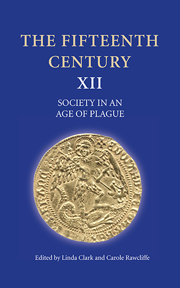Book contents
- Frontmatter
- Contents
- List of Illustrations
- Contributors
- Preface
- Abbreviations
- Introduction
- Looking for Yersinia Pestis: Scientists, Historians and the Black Death
- Pestilence and Poetry: John Lydgate's Danse Macabre
- Pilgrimage in ‘an Age of Plague’: Seeking Canterbury's ‘hooly blisful martir’ in 1420 and 1470
- An Urban Environment: Norwich in the Fifteenth Century
- Mid-Level Officials in Fifteenth-Century Norwich
- Leprosy and Public Health in Late Medieval Rouen
- Plague Ordinances and the Management of Infectious Diseases in Northern French Towns, c.1450–c.1560
- The Renaissance Invention of Quarantine
- Coping with Epidemics in Renaissance Italy: Plague and the Great Pox
- The Historian and the Laboratory: The Black Death Disease
- Index
- CONTENTS OF PREVIOUS VOLUMES
The Historian and the Laboratory: The Black Death Disease
Published online by Cambridge University Press: 05 September 2013
- Frontmatter
- Contents
- List of Illustrations
- Contributors
- Preface
- Abbreviations
- Introduction
- Looking for Yersinia Pestis: Scientists, Historians and the Black Death
- Pestilence and Poetry: John Lydgate's Danse Macabre
- Pilgrimage in ‘an Age of Plague’: Seeking Canterbury's ‘hooly blisful martir’ in 1420 and 1470
- An Urban Environment: Norwich in the Fifteenth Century
- Mid-Level Officials in Fifteenth-Century Norwich
- Leprosy and Public Health in Late Medieval Rouen
- Plague Ordinances and the Management of Infectious Diseases in Northern French Towns, c.1450–c.1560
- The Renaissance Invention of Quarantine
- Coping with Epidemics in Renaissance Italy: Plague and the Great Pox
- The Historian and the Laboratory: The Black Death Disease
- Index
- CONTENTS OF PREVIOUS VOLUMES
Summary
The Black Death, along with subsequent strikes of plague into the early modern period, has been the spark of academic debates over the past century or more. Before the 1990s discussion concentrated on the disease's consequences, first the demographic ones, then the plague's effects on economy, society, and religion: did the great destruction of population have a silver lining, leading to higher standards of living, especially for the lower tiers of the population? Did it lead to a more rational distribution of resources and a better organization of commercial society, as David Herlihy, Richard Goldthwaite and others have argued for Italy and especially Tuscany? Was it the trigger of the tidal changes in Renaissance and early modern culture? Did the deaths of so great a proportion of clerical populations across Europe serve to promote the importance of literature written in the vernacular? Did this demographic catastrophe among the clergy encourage a new dependence on the laity for religious solace and confraternity, while at the same time provoking challenges to religious authority and hierarchy? Was the Black Death at the origins of the Reformation?
None of these questions has been resolved; much depends on when and where in Europe, as well as the Middle East, such changes are, or their absence is, being observed. Many subsequent changes in culture and economy can be seen rising before 1348, and afterwards factors other than the Black Death or its demographic consequences contributed to these broad transformations in civilization.
- Type
- Chapter
- Information
- The Fifteenth Century XIISociety in an Age of Plague, pp. 195 - 212Publisher: Boydell & BrewerPrint publication year: 2013



